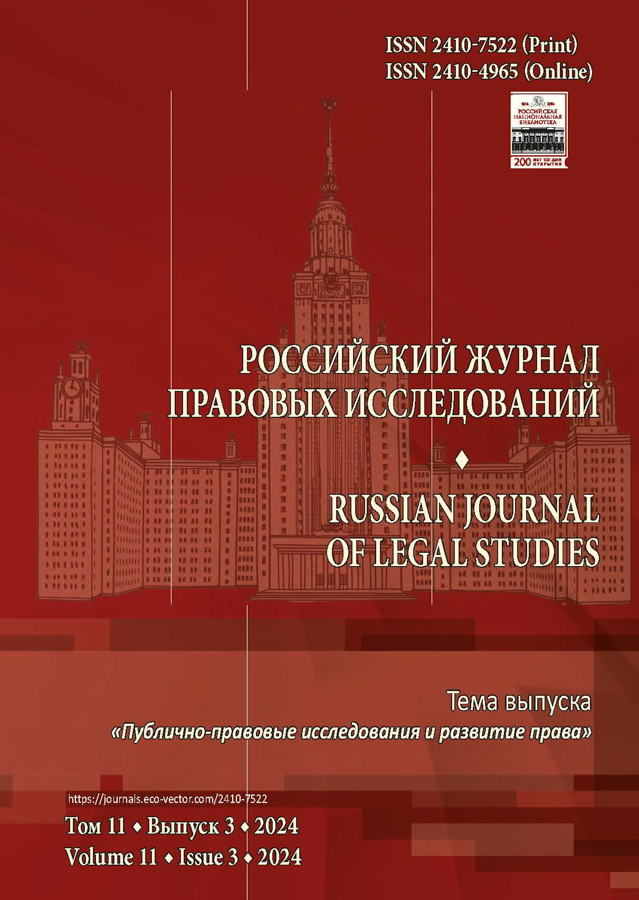The Role of Machine-Readable Law Technologies in Ensuring the Stability of Public-Government Communication
- Authors: Matyuk Y.S.1
-
Affiliations:
- Vladivostok State University
- Issue: Vol 11, No 3 (2024)
- Pages: 33-38
- Section: Theoretical and historical legal sciences
- Submitted: 29.12.2023
- Accepted: 21.05.2024
- Published: 21.10.2024
- URL: https://journals.eco-vector.com/2410-7522/article/view/625410
- DOI: https://doi.org/10.17816/RJLS625410
- ID: 625410
Cite item
Abstract
The relevance of this study stems from the rapid pace of digitalization and the widespread adoption of innovative digital technologies, particularly in public administration, alongside the significant political and legal changes that have ensued. The transparency and clarity of procedures for governing interaction between citizens and the state are expected to bolster the support and approval of management decisions, thereby enhancing the stability of public-government communication. Machine-readable law technologies can serve as tools for regulating these relationships. This study aims to analyze the use of machine-readable law technologies to ensure the stability of public-government communication under modern conditions. While the advantages of these technologies in the legal field are evident, attention must be given to potential challenges and risks, such as ensuring the accessibility of legal text, maintaining transparency, and addressing personnel-related issues. This study concludes that the implementation of machine-readable law technologies must be conducted with deliberate caution, incorporating expert opinions, sociological studies, and other specialized assessments. Mechanisms of public control and oversight by the professional community must also be involved. A joint human-machine approach to governance appears most promising, as it substantially mitigates the identified risks.
Full Text
About the authors
Yulia S. Matyuk
Vladivostok State University
Author for correspondence.
Email: 5080mm@mail.ru
ORCID iD: 0000-0003-3195-2349
SPIN-code: 8416-3781
senior lecturer, junior researcher
Russian Federation, VladivostokReferences
- Artemova ST. The impact of digitalization on development of the constitutional law doctrine. Constitutional and Municipal Law. 2023;(3):9–13. (In Russ.) EDN: MPUAIM doi: 10.18572/1812-3767-2023-3-9-13
- Kochetkov AP, Mamychev AYu, Mordovtsev AYu. Digital transit of public-power relations: general and elite characteristics. PACIFIC RIM: Economics, Politics, Law. 2022;(1):109–134. (In Russ.) EDN: WJIBWM doi: 10.24866/1813-3274/2022-1/109-134
- Vashkevich AM. Automation of law: law as electricity. Moscow: Simploer; 2019. (In Russ.)
- Lyubashits VYa, Mordovtsev AYu, Mamychev AYu. Theory of state and law. Moscow: RIOR; 2014. (In Russ.)
- Kazmina EA. Machine-readable law: main development trends. In: Proceedings of the international scientific and practical conference «State and law in the era of global change» / ed. by D.L. Prokazin. Barnaul; 2022. P. 455–457. (In Russ.)
- Malina MA. World justice and artificial intelligence. Magistrate judge. 2021;(4):17–21. (In Russ.) EDN: WFPKJV doi: 10.18572/2072-4152-2021-4-17-21
- Papysheva ES. Artificial intelligence as a threat to the principle of presumption of innocence. Advocate’s Practice. 2022;(5):2–5. (In Russ.) EDN: EDCRSD doi: 10.18572/1999-4826-2022-5-2-5
- Dyakonova MO, Efremov AA, Zaitsev OA, et al. Digital economy: current directions of legal regulation: scientific and practical guide / ed. by I.I. Kucherov, S.A. Sinitsyn. Moscow: Norma: IZiSP; 2022. (In Russ.) EDN: AGWXNX doi: 10.12737/18396909.
- Sharshun VA. Mashinochitayemoye zakonodatel’stvo: ponyatiye, spetsifika, perspektivy razvitiya. Pravo.by. 2022;(1):88–94. EDN: MOIKLN
Supplementary files








